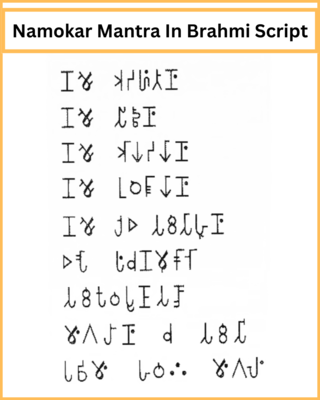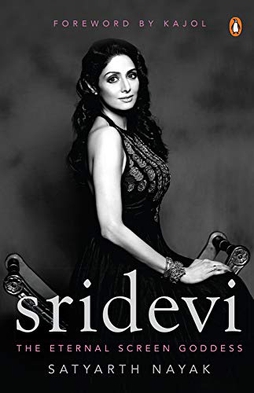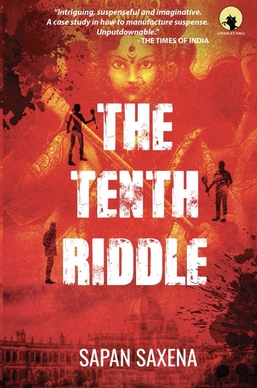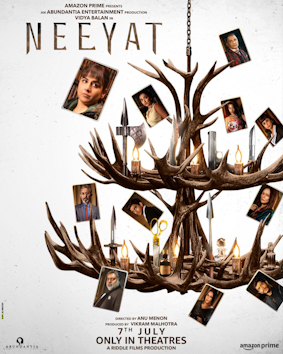
A mantra or mantram is a sacred utterance, a numinous sound, a syllable, word or phonemes, or group of words in Sanskrit, Pali and other languages believed by practitioners to have religious, magical or spiritual powers. Some mantras have a syntactic structure and literal meaning, while others do not.
The Gupta Empire was an ancient Indian empire which existed from the early 4th century CE to early 6th century CE. At its zenith, from approximately 319 to 467 CE, it covered much of the Indian subcontinent. This period is considered as the Golden Age of India by historians. The ruling dynasty of the empire was founded by Gupta, and the most notable rulers of the dynasty were Chandragupta I, Samudragupta, Chandragupta II and Skandagupta. The 5th-century CE Sanskrit poet Kalidasa credits the Guptas with having conquered about twenty-one kingdoms, both in and outside India, including the kingdoms of Parasikas, the Hunas, the Kambojas, tribes located in the west and east Oxus valleys, the Kinnaras, Kiratas, and others.
Rana is a historical title denoting an absolute Hindu monarch in the Indian subcontinent. Today, it is used as a hereditary name in the Indian and Pakistani subcontinent. "Rana" was formerly used as a title of martial sovereignty by Rajput kings in India. Rani is the title for the wife of a rana or a female monarch. It also applies to the wife of a raja. Compound titles include rana sahib, ranaji, rana bahadur, and maharana.
The Odia (ଓଡ଼ିଆ), formerly spelled Oriya, are an Indo-Aryan ethnic group native to the Indian state of Odisha who speak the Odia language. They constitute a majority in the eastern coastal state, with significant minority populations existing in the neighboring states of Andhra Pradesh, Chhattisgarh, Jharkhand and West Bengal.

100 Days is a 1991 Indian Hindi-language psychological thriller film, starring Jackie Shroff, Madhuri Dixit, Moon Moon Sen and Javed Jaffrey. The film is a mystery thriller that follows the events in the life of a woman with Extrasensory perception. It was a remake of the Tamil film 1984 Nooravathu Naal, which itself was an unofficial adaptation of the 1977 Italian giallo film Sette note in nero and American film Eyes of Laura Mars

Formerly known as the Oriental Library, the Oriental Research Institute (ORI) at Mysore, India, is a research institute which collects, exhibits, edits, and publishes rare manuscripts written in various scripts like Devanagari (Sanskrit), Brahmic (Kannada), (Nandinagari) (Sanskrit), Grantha, Malayalam, Tigalari, etc.

Mohit Suri is an Indian film director. Born into the Bhatt family, he is well known for directing the films Murder 2 (2011), the musical romance Aashiqui 2 (2013) and the romantic thrillers Awarapan (2007), Ek Villain (2014) and Malang (2020). He has been married to Udita Goswami since 2013.

Satyarth Prakash is an 1875 book written originally in Hindi by Dayanand Saraswati, a religious and social reformer and the founder of Arya Samaj. The book was subsequently revised by Swami Dayanand Saraswati in 1882 and has been translated into more than 20 languages including Sanskrit and foreign languages, including English, French, German, Swahili, Arabic and Chinese. The major portion of the book is dedicated to laying down the reformist advocacy of Swami Dayanand with the last four chapters making a case for comparative study of different religious faiths.
Indonesian Esoteric Buddhism or Esoteric Buddhism in Maritime Southeast Asia refers to the traditions of Esoteric Buddhism found in Maritime Southeast Asia which emerged in the 7th century along the maritime trade routes and port cities of the Indonesian islands of Java and Sumatra as well as in Malaysia. These esoteric forms were spread by pilgrims and Tantric masters who received royal patronage from royal dynasties like the Sailendras and the Srivijaya. This tradition was also linked by the maritime trade routes with Indian Vajrayana, Tantric Buddhism in Sinhala, Cham and Khmer lands and in China and Japan, to the extent that it is hard to separate them completely and it is better to speak of a complex of "Esoteric Buddhism of Mediaeval Maritime Asia." Many key Indian port cities saw the growth of Esoteric Buddhism, a tradition which coexisted alongside Shaivism.

Raat in Hindi or Raatri (transl. Night) in Telugu is a 1992 Indian supernatural horror film written and directed by Ram Gopal Varma. The film is shot simultaneously in Hindi and Telugu languages, and stars Revathi. The music was composed by Mani Sharma. It is his debut film as music director. Raat was noted as an effort to bring horror films into mainstream Hindi cinema.

Kaiyuan Temple is a Buddhist temple located in West Street, Quanzhou, China, and is considered as the largest Buddhist temple in Fujian province with an area of 78,000 square metres (840,000 sq ft). Kaiyuan Temple was one of the few surviving Hindu temples in mainland China. The central figures of veneration in the temple are the Five Tathāgathas from Chinese Esoteric Buddhism who are enshrined in the temple's Mahavira Hall. In 2021, the temple was inscribed on the UNESCO World Heritage List along with other sites near Quanzhou because of its importance during the medieval global maritime trade based in Quanzhou and its testimony to the global exchange of ideas and cultures.

Chinese Esoteric Buddhism refers to traditions of Tantra and Esoteric Buddhism that have flourished among the Chinese people. The Tantric masters Śubhakarasiṃha, Vajrabodhi and Amoghavajra, established the Esoteric Buddhist Zhenyan tradition from 716 to 720 during the reign of Emperor Xuanzong of Tang. It employed mandalas, mantras, mudras, abhiṣekas, and deity yoga. The Zhenyan tradition was transported to Japan as Shingon Buddhism by Kūkai as well as influencing Korean Buddhism. The Song dynasty (960–1279) saw a second diffusion of Esoteric texts. Esoteric Buddhist practices continued to have an influence into the late imperial period and Tibetan Buddhism was also influential during the Yuan dynasty period and beyond. In the Ming dynasty (1368–1644) through to the modern period, esoteric practices and teachings became absorbed and merged with the other Chinese Buddhist traditions to a large extent.

The Ekkos Clan is a mystery novel written by Indian author Sudipto Das, based on historical research. It was published by Niyogi Books and released in India in July 2013 and officially launched at a function in Bangalore on 3 August 2013.

The Mahabharata Secret is the debut novel by Indian author Christopher C. Doyle and was released on 21 October 2013 by Om Books. The story follows Vijay and his friends, as they try to decipher a series of clues which would lead them to a devastating Secret hidden by a brotherhood known as the Nine Men. Doyle had initially started writing a story for his daughter, which gradually expanded into the book. The author was primarily inspired by the Indian epic Mahabharata, believing its events to be based on scientific facts. The book was followed by Doyle's second novel, The Mahabharata Quest: The Alexander Secret, which is the first book in a planned trilogy of sequels.

The Aryabhata Clan (ISBN 978-9386906137) is the second novel by the Indian author Sudipto Das, published by Niyogi Books in December 2017. It was officially launched at the New Delhi World Book Fair, on 10 January 2018. Set against the backdrop of the Islamic State spreading its tentacles in India, it is a historical thriller and mystery novel where a 1,500-year-old verse composed by the Indian mathematician Aryabhata plays a crucial role in the deciphering of innumerable cryptic symbols, ancient signs, mysterious carpet motifs and a sinister plan to destabilize India.

Satyarth Nayak is an Indian author and screenwriter, known for his bestselling novel The Emperor's Riddles, authoring the biography of Sridevi and for scripting Sony's historical television epic Porus. The Emperor's Riddles turned out to be a bestselling thriller with the media calling it "a hit with young readers". Porus created by Swastik Productions was one of the most expensive and acclaimed shows on Indian television. Satyarth's biography of screen legend Sridevi titled Sridevi: The Eternal Screen Goddess published in 2019 by Penguin Random House also went on to win high praise. Satyarth has been named one of the Top 50 Indian authors to follow on social media.

Sridevi: The Eternal Screen Goddess is a biography by author and screenwriter Satyarth Nayak that chronicles the life and career of Indian actress Sridevi. Consisting of ten chapters, it describes her birth in 1963 in Egmore, her acting career in both the North and South Indian film industries, her marriage in 1996 to the film producer Boney Kapoor, with whom she has two daughters, and her death by accidental drowning in 2018. Published by Random House on 16 December 2019, the book was a success both commercially and critically, and reviewers commended it for the writing and comprehensiveness.

The Tenth Riddle is the third book by Sapan Saxena. It was released in October 2021 and is published by Locksley Hall. The novel follows murder of erstwhile princess of Goner, Rajasthan and how her murder is linked to a deep rooted secret in the history of Indian sub-continent. The novel deals with mythological themes, specifically centered around the prime Hindu goddess Adi Parashakti or Mahadevi and her ten forms of Mahavidya.

Neeyat (transl. Motive) is a 2023 Indian Hindi-language mystery film directed by Anu Menon. The film is produced by Vikram Malhotra under Abundantia Entertainment alongside Amazon Studios. It stars Vidya Balan with an ensemble cast including Ram Kapoor, Rahul Bose, Dipannita Sharma, Shashank Arora, Shahana Goswami, Neeraj Kabi and Amrita Puri. The film was released theatrically on 7 July 2023.
















